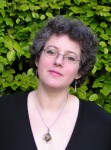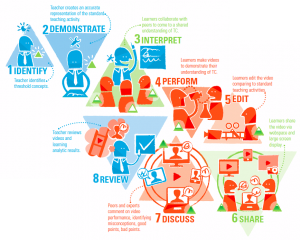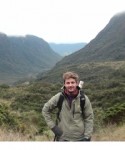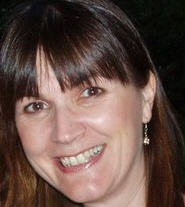I am a palaeoecologist at the Open University. My research involves reconstructing how our planet has changed over longer time scales in the past (1-2 million years). At first glance my research does not seem entirely relevant to current climate change but in fact it is integral. The climate system is hugely complicated and we still don’t fully understand how all the aspects work or how they interact together. One way of learning how the system operates is to simply observe it. The longer you observe it; then the better you will understand how it works and what are the possibilities for how it may change.
Presentations
JuxtaLearn – engaging students with science and technology through creative video performance
JuxtaLearn is a 3-year EU-funded project that has just passed the one-year mark and we are currently working to implement the technical aspects of the JuxtaLearn Process that we have developed.
In our presentation we give a little more detail about the challenges and findings from our first year. We showcase some of the videos made by the partners in the project to express their vision. One of these, the Teddy video, describes our efforts to come to a shared understanding of the project between the partners on the project, as well as introducing the workshops we held with teachers in school.

The goal of the JuxtaLearn Project is to enable students to overcome barriers to science and technology learning by exploring and sharing their understanding using creative video performance. By engaging student curiosity in difficult-to-learn science and technology subjects, the JuxtaLearn Process supports them along a creative route to a deeper understanding of topics that the teachers have identified as particularly problematic. The JuxtaLearn Process is illustrated, graphically, in Figure 1.

Communi-tea party at the academy

The academy and community: seeking authentic voices inside higher education - A workshop on creating and sustaining an engaged research community
On 11th November 2013, I facilitated a small workshop where participants explored some of the essential building blocks for creating and sustaining a research community that cultivates and delivers engaged academic practice. The session focused on features outlined in my research poster. A pdf of the poster, ‘COMMUNI-TEA PARTY AT THE ACADEMY’ can be downloaded – here.
TED-Ed: engaging with astrobiology research

As well as a Postdoctoral Research Associate in the Department of Physical Sciences at the Open University I have also been selected as a TED Fellow. Having been an avid watcher of the TED talks for many years I was inspired to apply to the Fellowship scheme so I could have a global stage on which to share the fantastic research being conducted in Astrobiology and to educate people worldwide on the subject of life in space.
How to lose publics and alienate people

Social exclusion in public engagement with science
On Monday last week I gave a presentation as part of the ‘Engaging Research’ seminar series being run at the Open University (as you might have guessed since this is their blog!) The seminar series runs in conjunction with two RCUK-funded projects: 'An open research university'; and 'Engaging opportunities'.
My research interests are around who ‘counts’ as a public for so called ‘public’ engagement and how do engagement practices contribute to the exclusion of certain groups.
Why technology-enhanced learning needs engagement

Last Monday, I gave a talk on my research as part of the 'engaging research' seminar series associated with the RCUK funded Catalyst and SUPI projects. I explained why I think engagement is so important.
In my research, I try to identify the range of stakeholders in a given learning context that will be affected by the introduction of a technology. Through understanding the activities that the stakeholders are involved in, I try to develop technologies that will be used to facilitate learning without causing too much extra work for any individual stakeholder. By engaging, I hope to understand the stakeholders' perspectives and where possible collaborate with them to create something they will find useful.
Here's the video of the seminar along with the slides (including the cited references) and abstract...


